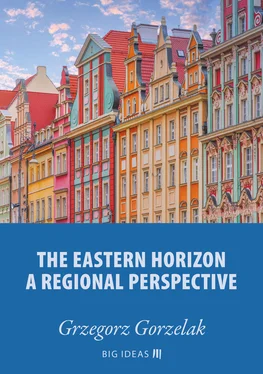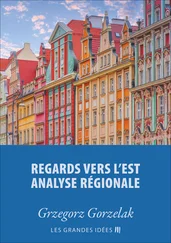Contents
BIG IDEAS BIG IDEAS Countries and regions in Central and Eastern Europe (CEE) have gone through several challenges. They went through totalitarian and authoritarian communist regimes, gained independence at the end of the 19 th century, faced new economic and political challenges and rejoined Europe in a perspective of mutual development. As different as they may be, despite recent populist movements, the CEE countries have much in common and regional policies can help the “forgotten places” to explore their opportunities, supporting democracy, cohesion, and local economies in the European Union. Grzegorz Gorzelak is a professor of economics, specialising in regional and local development policies and strategy building. He has collaborated with the World Bank, the OECD, DG Regio of the European Commission, several agencies of the Polish and Ukrainian governments, as well as regional and local authorities. This is the fourteenth essay in the Big Ideas series created by the European Investment Bank. The EIB has invited international thought leaders and experts to write about the most important issues of the day. These essays are a reminder that we need new thinking to protect the environment, promote equality and improve people’s lives around the globe.
THE EASTERN HORIZON
A BUMPY TRANSITION
EARLY 1990s: FIRST DEMOCRATIC ELECTIONS
CHALLENGES: INNOVATION, DEMOGRAPHIC GROWTH AND CLIMATE CHANGE
COHESION POLICY IN CENTRAL AND EASTERN EUROPE: ROLE AND ACHIEVEMENTS
REGIONAL DEVELOPMENT: WHAT’S NEXT?
END OF HISTORY?
BIOGRAPHY
About the European Investment Bank
The European Investment Bank is the world’s biggest multilateral lender. The only bank owned by and representing the interests of the EU countries, the EIB finances Europe’s economic growth. Over six decades the Bank has backed start-ups like Skype and massive schemes like the Øresund Bridge linking Sweden and Denmark. Headquartered in Luxembourg, the EIB Group includes the European Investment Fund, a specialist financer of small and medium-sized enterprises.
THE EASTERN HORIZON A REGIONAL PERSPECTIVE
Grzegorz Gorzelak

Disclaimer: The views expressed in this publication are those of the authors and do not necessarily reflect the position of the EIB.
Countries and regions in Central and Eastern Europe (CEE) have gone through several challenges. They went through totalitarian and authoritarian communist regimes, gained independence at the end of the 19 thcentury, faced new economic and political challenges and rejoined Europe in a perspective of mutual development.
As different as they may be, despite recent populist movements, the CEE countries have much in common and regional policies can help the “forgotten places” to explore their opportunities, supporting democracy, cohesion, and local economies in the European Union.
Grzegorz Gorzelak is a professor of economics, specialising in regional and local development policies and strategy building. He has collaborated with the World Bank, the OECD, DG Regio of the European Commission, several agencies of the Polish and Ukrainian governments, as well as regional and local authorities.
This is the fourteenth essay in the Big Ideas series created by the European Investment Bank.
The EIB has invited international thought leaders and experts to write about the most important issues of the day. These essays are a reminder that we need new thinking to protect the environment, promote equality and improve people’s lives around the globe.

The trajectories of the countries and regions of Central and Eastern Europe (CEE) during the last hundred years do prove that almost everything is possible. In this relatively short period these countries have regained independence, have suffered during World War Two, have gone through totalitarian and authoritarian communist regimes and lastly they have rejoined Europe, moving from the second to the “first periphery” of the developed world. Although at the start of their EU membership the “end of history” may have appeared as a plausible way to look to the future of CEE, recently unexpected phenomena have questioned these hopes and placed several new challenges before the new Member States.
“ After the initial period of institutional convergence, a few years ago a stream of right-wing populism movements emerged and spread in most of the CEE countries, and the European values of deliberative democracy and the rule of law have come to be replaced by growing centralisation.
Two of these challenges seem the most important: the political and the economic. After the initial period of institutional convergence, a few years ago a stream of right-wing populism movements emerged and spread in most of the CEE countries, and the European values of deliberative democracy and the rule of law have come to be replaced by growing centralisation, breaking constitutional orders and even introducing some manifestations of authoritarian rule. The migration crisis of 2015-2016 aggravated these processes, since all CEE countries disagreed with the EU’s stance on this issue. Thus, at this moment, the rationale of Eastern enlargement, although not yet questioned openly, has become a less obvious geopolitical decision than it appeared a decade ago.

MARCH 2020, THE 55TH KARLOVY VARY INTERNATIONAL FILM FESTIVAL, ONE OF THE OLDEST FILM FESTIVALS IN THE WORLD, WAS CANCELLED DUE TO THE CORONAVIRUS PANDEMIC.
The most recent coronavirus pandemic has posed additional economic challenges. It has to be remembered that the economic success of CEE was, to a great extent, the result of the incorporation of these countries into global value chains and the relocation of many industries from the West to the East of Europe. Foreign direct investment (FDI) was the main channel for innovation and technology transfers to the CEE countries. Global recession caused by the pandemic has seriously jeopardised the supply networks on which the economies of the CEE countries strongly depend. The broad tourist sector has become another field in which the CEE economies have suffered because of the pandemic.
These two challenges have a clear regional manifestation. The political changes clearly negatively affect local and regional governments, which in some CEE countries have already acquired a strong position in the institutional order of public management. The economic crisis may affect the metropolitan cores of the CEE countries, which since the post-socialist transition have become the main engines of transformation, attracting FDI into the modern value and knowledge-intensive services. The switch to teleworking and telecommuting may negatively influence metropolitan employment in CEE and leave many new offices idle, as well as hotels, apartments and tourist services in the largest cities of CEE. By the same token, weakening of industrial networks may jeopardise the development of several industrial regions in CEE which have gone through successful industrial restructuring, to a large extent due to the involvement of Western European capital (now under protectionist pressure of several EU governments).
Читать дальше















